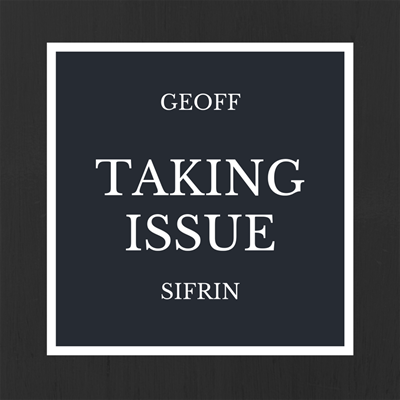GEOFF SIFRIN
Taking Issue
The kneejerk response of some Jews to last week’s UN Security Council resolution declaring Israel’s West Bank settlements a violation of international law was to scream “anti-Semitism!” and “the UN hates Israel.” Israeli PM Benjamin Netanyahu called the resolution “shameful” and lashed out against its supporters.
The uncomfortable truth is that Resolution 2334 is neither anti-Semitic nor anti-Israel. Most countries that voted for it are Israel’s friends. The Security Council’s permanent members, the United States (which refrained from vetoing it, effectively allowing it to pass), Britain, France, China and Russia, as well as non-permanent members spoke together with a crystal-clear message: For the community of nations, the settlements are illegal.
 Predictably, the South African government, which has full diplomatic relations with Israel as well as a long history of comradeship with the Palestinians, called the resolution “long overdue”.
Predictably, the South African government, which has full diplomatic relations with Israel as well as a long history of comradeship with the Palestinians, called the resolution “long overdue”.
One of the bitterest fights within the Jewish world today, reflected also in South African Jewry, is about Israel’s occupation of the West Bank. Many passionately pro-Israel Jews are unable to defend the country when it is accused of apartheid because Palestinians live under an occupation which has lasted half a century, with a full panoply today of humiliating checkpoints, separate roads, different legal systems and so on. Jewish bodies such as the SA Jewish Board of Deputies valiantly proclaim support for a two-state solution – which corresponds with the government’s line – but are left helpless to defend Israel when illegal settlements proliferate in the West Bank and threaten to make that solution impossible.
A significant proportion of Jews worldwide are dismayed by the impunity with which a relatively small group of ultra-nationalistic, religious Jewish settlers who have a lock-hold on Israel’s government, call the tune and sabotage any possibility of peace. Netanyahu’s claim that the settlements are not the obstacle to peace reflects the complexity of the situation, but does not help Jews who have to defend Israel in the world at large.
Anyone who understands Israel’s context knows ending the settlements will not automatically end the conflict. The Middle East is in turmoil, and the Palestinians have squandered numerous opportunities to get their state, opting instead for terrorism. The rise of Hamas in Gaza after Israel’s withdrawal is a prime example. A change in Palestinian attitudes is demanded by Israel and its friends. But those same friends regard the settlements as illegal.
Settlement supporters take the opposite view, seeing them as today’s authentic Zionism, part of the battle against an anti-Semitic world which wouldn’t care if Israel was eliminated. They accuse anti-settler Jews, such as the Jewish organisation J Street, of being naïve fools who if allowed their way would end up helping Israel’s defeat by its enemies. US president-elect Donald Trump’s proposed US ambassador to Israel David Friedman, an avid settler supporter, likened J Street to the “kapos” – Jews who under the Nazis helped implement European Jews’ extermination.
Settler supporters are mistaken, however, when they declare that Resolution 2334 will spur a new drive to expand Israel into the territories, such as Tzipi Hotovely, Israel’s deputy foreign minister, who says “No decision will cause Israel to stop building on its own land.” Israel cannot forever thumb its nose at the massive global constituency which rejects the settlements.
Resolution 2334 does not say the final Israel-Palestine border should be the 1967 armistice line, which is unacceptable for Israel’s security. But it won’t recognise changes unless agreed by the parties. Such changes have already been agreed repeatedly in previous Israeli-Palestinian negotiations, where settlement blocs become part of Israel in exchange for Israeli land elsewhere going to Palestine. Jerusalem is the thorniest issue, but even there workable formulas are possible.
The resolution has no short term practical implications. No settlements will be dismantled because of it. But in the long-term countries and organisations may refuse to deal with the settlements, citing the resolution.
Israel is an incredible success story, of which Jews are justifiably proud. Resolution 2334 is a wake-up call from its friends. A wise Israeli leader might see opportunity here to shift direction. But wise leaders are in short supply.
Michael Keet
Dec 28, 2016 at 8:01 pm
‘Good article, probably an accurate response’
Syd Kaye
Dec 30, 2016 at 3:07 pm
‘it may not have been anti Semitic or anti Israel but it was misplaced and gave comfort to Israel’s enemies. Kerry and Obama have a certain smugness found in armchair \”liberals\” which is not appropriate when dealing with the UN, because firstly it is anti Semitic , anti Israel and untrustworthy and secondly the security council contains expert proponents of realpolitik who do not base their actions on concepts and nuances but on their countries’ interests, particularly Russia, China and France. The only relevant question the US should have asked itself was does this resolution benefit or weaken its ally, and does it strengthen others who are either direct enemies or strategic competitors of the US. The answer is obvious and allowing the resolution to pass a grave error. Kerry’s speech was childish and embarrassing. He ignored or is unaware of the Palistinian policy of rejectionism , was a suitable swan song for 8 years if weakenng the West and strengthening Russia and Iran and illustrated how unsuitabke Obama and Kerry were as custodians of Western interests. ‘
Choni
Jan 4, 2017 at 7:35 am
‘Sorry Choni, your previous comment was deleted and this one too. It is arrogant for you to believe that you have an opinion while others are not allowed to. I, too, have strong opinions. But I would never presume to apply Fascist-type techniques of not allowing others to air theirs if they differ from mine. -ANT KATZ, ONLINE EDITOR‘